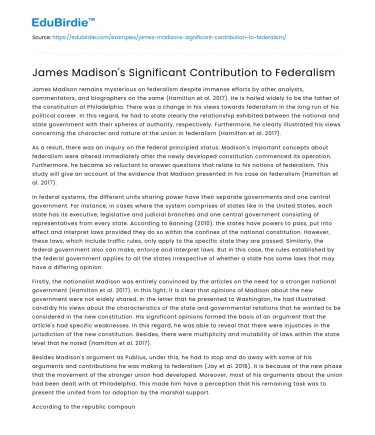James Madison remains mysterious on federalism despite immense efforts by other analysts, commentators, and biographers on the same (Hamilton et al. 2017). He is hailed widely to be the father of the constitution of Philadelphia. There was a change in his views towards federalism in the long run of his political career. In this regard, he had to state clearly the relationship exhibited between the national and state government with their spheres of authority, respectively. Furthermore, he clearly illustrated his views concerning the character and nature of the union in federalism (Hamilton et al. 2017).
As a result, there was an inquiry on the federal principled status. Madison's important concepts about federalism were altered immediately after the newly developed constitution commenced its operation. Furthermore, he became so reluctant to answer questions that relate to his notions of federalism. This study will give an account of the evidence that Madison presented in his case on federalism (Hamilton et al. 2017).
Save your time!
We can take care of your essay
- Proper editing and formatting
- Free revision, title page, and bibliography
- Flexible prices and money-back guarantee
In federal systems, the different units sharing power have their separate governments and one central government. For instance, in cases where the system comprises of states like in the United States, each state has its executive, legislative and judicial branches and one central government consisting of representatives from every state. According to Banning (2010), the states have powers to pass, put into effect and interpret laws provided they do so within the confines of the national constitution. However, these laws, which include traffic rules, only apply to the specific state they are passed. Similarly, the federal government also can make, enforce and interpret laws. But in this case, the rules established by the federal government applies to all the states irrespective of whether a state has some laws that may have a differing opinion.
Firstly, the nationalist Madison was entirely convinced by the articles on the need for a stronger national government (Hamilton et al. 2017). In this light, it is clear that opinions of Madison about the new government were not widely shared. In the letter that he presented to Washington, he had illustrated candidly his views about the characteristics of the state and governmental relations that he wanted to be considered in the new constitution. His significant opinions formed the basis of an argument that the article's had specific weaknesses. In this regard, he was able to reveal that there were injustices in the jurisdiction of the new constitution. Besides, there were multiplicity and mutability of laws within the state level that he noted (Hamilton et al. 2017).
Besides Madison's argument as Publius, under this, he had to stop and do away with some of his arguments and contributions he was making to federalism (Jay et al. 2018). It is because of the new phase that the movement of the stronger union had developed. Moreover, most of his arguments about the union had been dealt with at Philadelphia. This made him have a perception that his remaining task was to present the united from for adoption by the marshal support.
According to the republic compound, there was a need to accommodate Madison's contribution, position, and elements which he had set in the federalism during the nationalist days (Jay et al. 2018). This is regarding the issue of the bank that has been witnessed. Madison was jumping from one state and national relations to another.
In conclusion, Madison had a more significant contribution to the federalism. As earlier discussed, much evidence supported his case. Furthermore, ‘Federalist No. 51’ was a paper done by James Madison, enhancing means by which there can be appropriate creation of checks and balances in the government. Besides, advocating for the separation of powers in the US national government. Madison's ideas were vital immediately after the implementation of the new constitution.
References
- Banning, L. (1998). The sacred fire of liberty: James Madison and the founding of the federal republic. Cornell University Press.
- Hamilton, A., Madison, J., Jay, J., & Trees, A. (2017). The Federalist Papers. Race Point Publishing.
- Jay, J., Hamilton, A., & Madison, J. (2018). The federalist papers. BoD-Books on Demand.






 Stuck on your essay?
Stuck on your essay?

